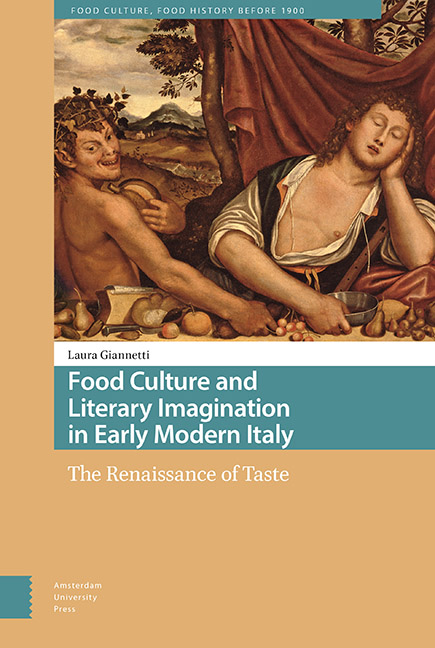3 - Attending Poetic Banquets: The Erotics of Food Poems and the Discovery of Taste
Published online by Cambridge University Press: 13 May 2022
Summary
Abstract
The rich literary production, both high and low, that makes use of humorous and at times outrageous sexualized images of vegetables and fruit is studied here in relation to medical-dietetic literature that stigmatized such foods as well as to contemporary conceptions of sexuality. Using primarily little-studied ‘Bernesque’ literature as an example of ‘embodied imagination’, this chapter describes and analyzes how a number of Renaissance Italian poets imagined a carrot or a peach in ways that meld its shape, nutritional characteristics, metaphorical implications, and material qualities. The embodied experience of eating and tasting such fruits and vegetables, both literally and metaphorically, became a vehicle for expressing new and potentially revolutionary ideas about gusto a century earlier than has been recognized to date.
Keywords: Bernesque literature, embodied imagination, sexuality, eroticism, fruit and vegetables
[…] degli amatori della Poesia. La quale, si Come tutte le altre cose che ci nascono, ancora ella ha I suoi frutti e i suoi fiori: & se quei giovano al gusto, Questi dilettano all’odorato, & l’uno senza l’altro ordinariamente non viene in luce
Introduction
As we have seen in the last chapter, the phallic splendors of the triumphant sausage provided much fodder for literary texts; following in its footsteps, this chapter considers a broader sampling of bawdy poems in praise of fruit and vegetables. The works discussed herein were written between the 1520s and 1540s and were printed, reprinted, commented upon, and imitated widely in the two centuries that followed. Contemporary with the writing of these poems on the sexual virtues and vices of humble and rustic vegetables or elegant and luxurious fruit was a cultural climate that saw abundant artistic representations of gardens and their produce, many depicting sexual and sensual pleasures. In the visual arts, this theme was most famously represented in the border decorations of the Loggia di Psyche in the Villa Farnesina in Rome, where Giovanni da Udine depicted garlands of fruit and vegetables with sexually evocative shapes. On a humbler level, domestic objects as well played on the erotic connotations of fruit and vegetables.
- Type
- Chapter
- Information
- Food Culture and Literary Imagination in Early Modern ItalyThe Renaissance of Taste, pp. 149 - 200Publisher: Amsterdam University PressPrint publication year: 2022



